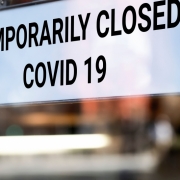Many states, cities and counties are about to, suddenly, run out of money. Wages won’t be paid. Services won’t be delivered. Institutions will shut down abruptly. Many state colleges may fold. And yet most state and local political and administrative leaders just sit and watch. Voters will not be pleased.
Millions of American workers filed for unemployment insurance during the past two weeks. That is a record and represents a collapse of our local economies. Across the country, in every state, county and city, businesses have been shut down, and many will not return after the coronavirus crisis is over. Tens of millions have lost jobs, homes, savings and retirement incomes that will never return. Owners of rental property will go under when their loan payments come due and renters can’t pay. Across the country, state and local economies are being badly damaged — many of them permanently.
The result is that state and local tax revenues will plummet. States and localities will burn through any reserves they’ve maintained like wildfire. Since most of our politicians and government managers have been raised during a decade of expanding economies, their first instinct will be to wait and then panic and then raise taxes to cover shortfalls — perhaps a special “coronavirus surtax.” Taxpayers across the country have tolerated various forms of high state and local taxes; the politicians would naturally ask, “Why should now be any different?”
But it is different. The resulting increased tax burden would be a disaster. Businesses that were barely hanging on would go under. Workers and homeowners who were barely surviving would go under. State and local tax bases would collapse even faster. There would be social unrest, possibly requiring martial law. People would migrate from high-tax states toward new jobs, accelerating a downward spiral. These large migrations would make the 2020 census results nonsense.
The only answer for the states, counties and cities that want to survive is to slash budgets now — probably 30 to 50 percent — eliminate all nonessential spending and reduce taxes today. Business leaders know that, in these types of situations, the only way to save a company is to cut costs immediately. There is no other answer, and those who act first and most aggressively are the most successful in saving the company and the greatest number of its employees. In short, “fiscal distancing” — that is, separating politicians from taxpayers’ money by cutting budgets and taxes now — is literally the only useful thing that state and local governments can do to prevent further economic and social catastrophe.
There is actually no other significant role that states and local governments can play in saving their economies, tax bases and quality of life. Only the federal government can provide truly useful, significant financial help to businesses and individuals during this historic disaster because only the federal government can print money in a crisis. Cutting taxes is the only state and local option to help their economies. Spending extra money now is throwing rocks into their own lifeboats.
I’ve talked to and written to many state and local officials over the past couple of weeks. Their recorded messages say they are all “working nonstop on coronavirus task forces.” Not to be rude, but most of that is a complete waste of time and public resources. With few exceptions, little or nothing useful will come of that. Only private businesses, individuals and the federal government are able to address this problem. For the most part, state and local governments will be in the way, except for critical, essential services such as police forces, fire departments and health care. Nearly everything else must go, now.
Of course, I’m not optimistic that many officials or politicians at the state or local levels will take massive budget cuts or slashing taxes seriously — yet. They were raised in a different world of explosive economic growth. Most would prefer to promote vanity and virtue-signaling projects from their towering sandcastles they’ve built with taxpayer money over the past couple of decades, even as their castles crumble around them. They could never grasp that cutting taxes is the only tool they have to preserve their states, counties and cities. The concept is far beyond their political vocabulary — none of them could grasp the public finance, let alone the Darwinian game theory, aspects of the enormous challenge in front of them.
States are now furiously competing for ventilators. Tomorrow they will be fighting for taxpayers. Their primary (only) goal today should be to support and save their local economies — businesses, homeowners and other taxpayers — so that they have a foundation left on which to build later. If they kill off their tax base or drive businesses and taxpayers out of their states or localities, they will have poured salt on their fields and they will starve in the future. Their political careers will be over.
And so, as the coronavirus preys on the weakest human bodies, it also preys on the weakest state and local politicians. We can only hope that the fiscal mortality rate among those will be lower than the models suggest. In the end, though, the ruthless force of American politics probably will claim a new crop of unexpecting victims.












